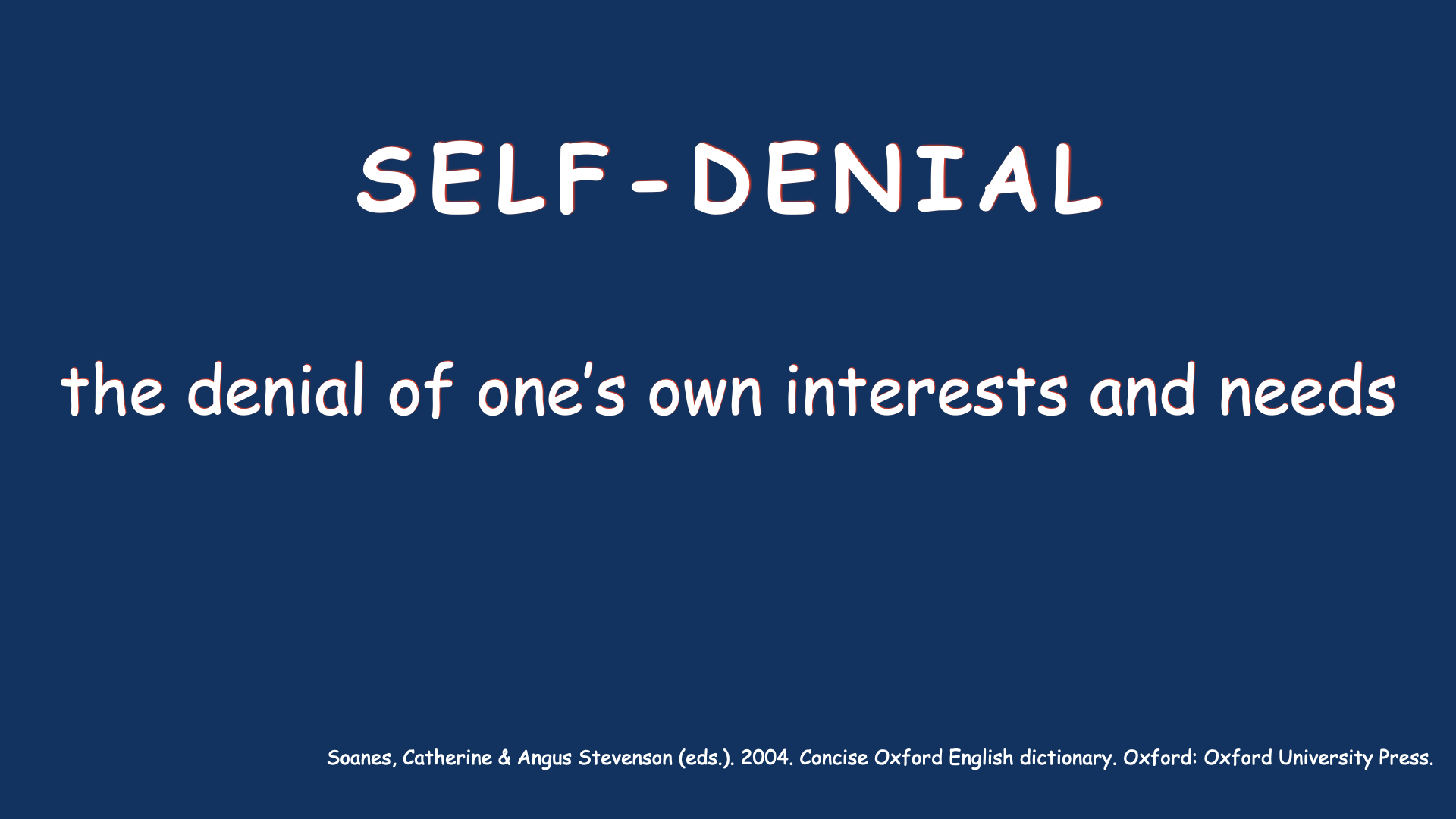|
|
Self-Denial
This lesson on self-denial is the first of four Bible study lessons in the Who Am I Bible Study. This Bible study is designed to be done over a five day period. We provide the daily study questions on this page for you. There's a link at the bottom of this page where you can compare your answers.
To deny yourself is the exact opposite of being selfish. Self-denial requires nothing less than someone renouncing him or her self. It demands the deliverance of our will from our false egoistic center in order to align ourselves with Jesus Christ. It's the exercise of a lifetime and the inner principle of daily Christian discipleship.1 We find it practiced in both the Old and New Testament. Self-denial is the subject of this Bible study.
Day One

QUESTION 1: Over twenty years ago, the Baker Encyclopedia of Psychology and Counseling observed that: "Narcissism is often glorified, and the media thrust such persons at us as role models. Yet this is also a time in which people struggle with a despairing sense of lost or undeveloped self."1
How does society encourage us to avoid self-denial? Can you cite any examples? How have you have avoided their influence?
QUESTION 2: The actual word "self-denial" is found rarely in the Old Testament, and only in Leviticus in the Christian Standard Bible.
However, there are several examples of the concept being played out in the lives of notable figures. Here's some examples:
- Abraham, when he accorded to Lot, his junior, his preference of the land of Canaan, Gen. 13:9, with 17:8.
- Moses, in choosing rather to suffer affliction with the people of God than enjoy the pleasures of sin, Heb. 11:25; in taking no compensation from the Israelites for his services, Num. 16:15.
- Samuel, in his administration of justice, 1 Sam. 12:3, 4.
- The widow of Zarephath, in sharing with Elijah the last of her sustenance, 1 Kin. 17:12–15.
- Daniel, in his abstinence, Dan. 1:8; in refusing rewards from Belshazzar, Dan. 5:16, 17.
- Esther, in risking her life for the deliverance of her people, Esth. 4:16.
- The Rechabites, in refusing to drink wine or strong drink, or even to plant vineyards, Jer. 35:6, 7.2
Read Leviticus 16:29-31 and 23:27-32. Here we see the commandment of Moses to the Israelites to deny themselves.
For what reasons did God have Moses instruct the Israelites to deny themselves, and how often were they told to do so?
Surely you desire integrity in the inner self,
and you teach me wisdom deep within.
Psalm 51:6
2020. Christian Standard Bible. Nashville, TN: Holman Bible Publishers.
Day Two
Question 1: In the second chapter of the Book of Ecclesiastes, Solomon explains his experience with not withholding any pleasures from himself. Read Ecclesiastes 2:1-11. What were the pleasures he pursued in the following verses 2 through 8? What was the end result of his experience from verses 1-11?
Question 2: One method of self-denial for Christians is fasting. The idea of fasting is found throughout the Bible. We see fasting commanded on the Day of Atonement in the Old Testament and practiced habitually in the New Testament (see Matthew 9:14, Mark 2:18, Luke 2:37, Acts 10:30).
If we studied why the people were fasting we would see that there were different reasons. For example,
- Moses fasted when he interceded on behalf of the Israelites (Deuteronomy 9:18)
- The residents of Jabesh-gilead fasted for seven days after Saul and his sons were slain by the Philistines (I Samuel 31:13)
- David humbled himself, prayed and fasted when he was afflicted by his enemies (Psalm 35:13)
- The church at Antioch prayed and fasted when they ordained Paul and Barnabas for missionary work (Acts 13:3)
Why should we fast? Also, how did Jesus command us to fast in Matthew 6:16-18?
Finally, what spiritual benefit have you personally received when fasting?
Day Three

Question 1: Jesus offers the greatest challenge to self-denial to his followers in Mark 8:34-38. Here he explains what Christians must do to become his followers.
What are the three things he says his followers must do in this passage to be his disciple?
Question 2: Jesus offers the explanation that if someone wants to follow him he must lose his life. But then he explains that if he does lose his life, he will in fact save his life (verse 35).
How can this be explained? The cross signified crucifixion and the Jews living during Jesus' time were very familiar with this cruel method of execution. To help us understand the context of this passage, the Zondervan Illustrated Bible Backgrounds Commentary offers the following insights:
"In the first century, crucifixion was one of the most feared forms of execution, used effectively by the Romans as one of the strongest forms of deterrence against insurrection or rebellion. It was a dreadful way to die.
Condemned victims were often forced to carry a cross-beam to the scene of the crucifixion. They were nailed to it, which in turn was nailed to the upright beam, which was then hoisted into place.
The horror of the cross will be Jesus' own tragic fate, but in what must have been to the disciples a shocking shift of emphasis, Jesus uses the cross and crucifixion as an image of discipleship."3
How could the disciples have made sense of this command by Jesus; and equally as important, how can modern day Christians make sense of this command to "take up our cross" every day?
Day Four

Question:
The Bible teaches us that Christian life involves three deaths. One is legal, one is moral, and another is physical.
Research these Scriptures. Identify exactly how the Christian is to be involved in these three different deaths.
The First Death:
- Romans 6:6, 11
- Colossians 3:5
The Second Death:
- Matthew 16:24
- Colossians 2:20
The Third Death:
- II Corinthians 4:7-12
- II Corinthians 4:16
Day Five
Question:
What is something you can do daily to deny yourself in order to bring glory to God?
Secondly, how can you avoid bringing glory to yourself in doing so?
Click here to compare your answers.
Please know that as an Amazon Associate we earn from qualifying purchases linked on this site.
|
1 Wahking, H. 1999. Self-Denial. (Ed.) David G. Benner & Peter C. Hill. Baker Encyclopedia of Psychology & Counseling (Baker Reference Library). Grand Rapids, MI: Baker Books. |
 |
|
2 Swanson, James & Orville Nave. 1994. New Nave’s Topical Bible. Oak Harbor: Logos Research Systems. |
 |
|
3 Wilkins, Michael, J. Matthew. 2002. Zondervan Illustrated Bible Backgrounds Commentary. Grand Rapids, MI: Zondervan. |
 |